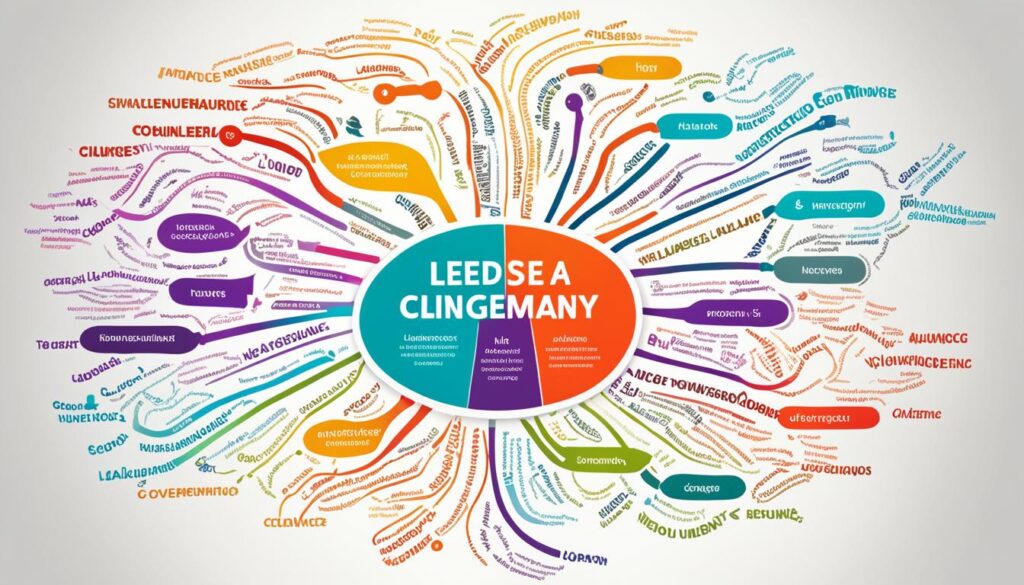In 2024, the digital world is changing fast. Search engine optimization (SEO) is now more critical than ever. To get big traffic and be seen more online, we need to master keyword research.1
Keyword research is key for our content plans. It’s not just about choosing words for our pages. We dive into what our audience really wants. We learn the questions they ask and the words they use.1
With smart keyword research, we can meet our audience’s needs better. This helps bring more people to our sites and find new customers.1
Key Takeaways
- Keyword research is essential for improving website visibility, user traffic, and conversions.
- Understanding search intent is crucial for creating content that ranks higher on search engines.
- Long-tail keywords offer higher conversion rates and are less competitive.
- Analyzing keyword difficulty and search volume helps estimate the potential of a keyword.
- Incorporating question-based keywords can boost visibility in voice search and featured snippets.
The Significance of Keyword Research in SEO
Keyword research is the core of SEO.2 It focuses on attracting the right visitors. You learn what your audience looks for on Google.3 This helps you create better content that meets their needs. By doing so, you increase your SEO success chances.2
To find the right keywords, first, you identify what people search for. Then, you look at how hard it is to compete with those terms.3 Next, you carefully use these keywords in your content. This boosts how well you show up in search results.
Defining Keywords and Their Role in Search Engine Optimization
Keywords are what users type into search engines.3 For SEO, they’re the specific searches you want your site to come up for. This helps bring visitors directly to your site or blog.
How to Find the Right Keywords
To find the right keywords, you need to know how your audience searches. This means using research tools and looking at what your competitors are doing.23
Identifying Your Target Audience’s Search Habits
Knowing how your audience searches is key.3 It shows you the exact words and phrases they search for when looking for what you offer.
Using Keyword Research Tools for Effective Keyword Discovery
Using keyword research tools gives you insights. It helps find keywords that your audience is really interested in searching for.23
Exploring Competitor Keywords and Keyword Gap Analysis
Looking at your competitors’ keywords shows you new chances.3 You can then make your content aim for those topics. This way, you can do better than your competition.
Analyzing Keywords for Maximum Impact
The core of strong search engine optimization (SEO) is keyword analysis. It helps us see the big picture of different search terms. Two key measures, keyword difficulty and search volume, help set our course. Keyword difficulty shows how hard it is to rank high on search results. Search volume reveals how popular a keyword is over a set time.4
Our study doesn’t stop at these basic numbers. We look into why people search for a term, known as search intent. Understanding this lets us make content that truly connects with our audience’s needs.4
Long-tail keywords are also huge for us. They are longer, more detailed phrases. People use them when they’re ready to buy or while using voice search.4 Adding long-tail keywords to our plan helps us reach smaller, focused groups. This often means more sales than chasing broad keywords.4
So, our keyword analysis covers everything from difficulty and volume to why people search and the use of long-tails. This varied strategy ensures we get the best results. It attracts quality visitors and real, measurable benefits for our clients.45
Understanding Keyword Difficulty and Search Volume
Keyword difficulty tells us how hard it is to rank high on search results for a word. A lower score means ranking is easier. Search volume shows how often a word is looked up in search engines.6
The Significance of Search Intent in Keyword Selection
Search intent dives deeper than just the keyword to know why people search for it. Knowing this helps us make content that directly answers users’ needs. This boosts our rank and brings more visitors who may become customers.
Leveraging Long-Tail Keywords for Niche Targeting
Long-tail keywords are detailed and specific, often used near the point of buying or in voice searches. They have less competition, lead to more sales, and are simpler to rank for than common keywords.6 Using long-tail keywords helps us aim at smaller, specific groups with our content. This enhances engagement and sales.
Advanced Keyword Research Strategies
To stay ahead in SEO, you need to find and use trending keywords early. Tools like Google Trends give insights into popular search terms. These can often be relevant to your niche.7 You should use various tools, including SEMrush and Ahrefs, to study what high-traffic pages do. You should also check out related keywords using latent semantic indexing (LSI).8
Predicting and Capitalizing on Keyword Trends
We look at why people search – for information, to buy, to find a website, or to make a deal8. This helps us make content that matches what users are looking for. Using SEMrush or Google Ads to check keyword competition is also wise8.
Semantic Keyword Research for Comprehensive Content Creation
This kind of research finds words related to your main ones, making your content more complete8. Search engines aim to understand why people search to show better results. Creating content like this covers more of what people might search for.
Integrating Question-Based Keywords for Enhanced Visibility
Voice search and mobile use have made questions more popular7. Answering common questions in your content helps you get noticed. It can get you a spot in voice search or as a featured answer.
At Romain Berg, we use many advanced strategies in keyword research. We make sure our clients’ content is always on point. This includes looking at competitors, finding what’s popular, and using question keywords. We aim to get the best out of SEO for our partners.
Harnessing the Power of Keyword Research Tools
Many keyword research tools simplify finding the right keywords. They show search volume, competition, and trends. Tools like Google Keyword Planner, Ahrefs, SEMrush, and AnswerThePublic have lots of keyword info.9 You type in your main keyword, and these tools give related words. They also show which words are best for your goals.9 Romain Berg has its own tools. They use both basic keyword data and complex analysis. This helps find great keywords that others might miss.
The person behind AIContentfy got 100k visitors a month in 10 months. This shows how good keyword research tools are.9 Short-tail keywords get searched a lot. But many people are also trying to rank for them.9 Long-tail keywords might not get as many searches. But, they can help you get more people to take action.9 These advanced keyword research tools find keywords that fit your content well and get a lot of views.9
Google Trends and Search Volume show which keywords are popular over time.9 Google’s Related Searches and Auto-complete Suggestions can give you more keyword ideas. By checking Google’s SERPs, you see who your keyword rivals are and what users want.9
Look at both free and paid search results to learn about user needs, what your competitors do, and your content’s gaps. Studying your rivals can show what works and how to stand out.9 Reviewing your Google AdWords ads helps make your ads better. It tells you what people click on, what they buy, and what it costs you.9Use several keyword research tools to improve your SEO now and in the future. They match what people search for with what you offer. This strategy makes your content more likely to be seen and loved.
Decoding Your Audience’s Language
Understanding your audience’s language opens a door to their world. It’s all about listening and adapting, not guessing. This means finding the words they use when looking for what you offer.10 High-intent keywords, like “buy” or “hire”, draw in visitors ready to take action.10 Romain Berg’s approach helps find these key terms. This way, your content speaks directly to what your audience wants.
Learning your audience’s special10 language, likes, and how they search helps. It lets you make content that really connects with them.10 It improves how well your content works, making it more likely people will respond to your message. This is because your message meets their needs and wants perfectly.
At Romain Berg, we’re experts in10 learning about audiences and11 figuring out keywords. We use top tools like11 Google Search Console and advanced keyword tools. This way, we learn the exact words your audience uses. Then, we make sure your content hits the mark for the best results.
Success today isn’t just about being noticed. It’s about being found by the right people at the right moment. By10 fitting your content with your audience’s language and10 choosing high-intent keywords, you open doors for your brand. You become the top choice for your customers.
Navigating the Keyword Tool Landscape
Keyword research is key to a strong SEO plan. It involves diving into tools that find the best keywords for you. To begin, Google Keyword Planner is essential for newcomers1213. It uses Google’s vast info to show search volume and competitiveness. This info kickstarts your keyword exploring.
Google Keyword Planner and Its Role
Google Keyword Planner is free and pulls info from Google itself12. It shows search volume, how tough it is to rank for a keyword, and related terms. Knowing this helps you pick the best keywords for your site’s content and SEO.
Leveraging Advanced Tools: SEMrush, Ahrefs, and More
Starting with Google Keyword Planner is good, but more insight comes from tools like SEMrush and Ahrefs1213. These tools provide lots of data, from keyword difficulty and search volume to the potential benefit of targeting certain keywords. They let you dig deep into your rivals’ keyword methods. That way, you can find spots they might have overlooked13.
At Romain Berg, we’ve made our own tools that combine traditional and advanced analyses12. Our tools find keywords high in intent, often missed by others. This helps us make SEO plans that are perfect for our clients and the ever-changing keyword world1213.
Understanding the Importance of Accurate Keyword Data
Knowing search volume is like seeing the demand in the market. Keywords that many people search for can bring more visitors to your site.14 For instance, ‘keyword tool’ is looked up 10,000 times monthly. But ‘keyword planner’ is searched over 60,000 times a month.14 It’s also key to look at how hard it is to rank for a keyword. Words that many sites are trying to rank for might be tough. Yet, not all popular terms are hard to rank. Balancing popularity with ranking ease is essential.14
The Role of Search Volume in Keyword Selection
MSV counts how often a keyword is searched each month by everyone. It helps understand how popular a term is.2 For example, “inbound marketing” has about 6.6K searches a month. But “SEO” gets a huge 110K searches monthly.2 It’s vital to know what people want when they search to be able to rank.2
Analyzing Keyword Difficulty for SEO Success
Keyword difficulty tells us how hard it is to rank for a keyword.15 Shockingly, Ahrefs found that almost 91% of Google’s indexed pages get no traffic.15 Longer, more specific keywords have less traffic but can attract more when used correctly. Yet, short and common keywords bring in bigger traffic but face high competition.15 This data guides us to find the best keywords to aim for.15
Why Keyword Trends and Predictions Matter
Staying updated on keyword trends with Google Trends keeps us ahead.15 It allows us to focus our content on what’s popular with users. Predicting search trends helps us prepare our content strategy early.14 Moreover, using a keyword planner with top-ranking page suggestions sets a solid ground for content making.14
Keyword Tool for Optimized Content Strategies
These keyword tools boost your SEO projects now and in the future. They match what users look for and how they search.7 SEO’s core is knowing what your clients want and being there when they look. With these tools, your keyword search plan will be strong.16 It’s not only about picking popular keywords but also about understanding what searches mean. This way, your content will meet your viewers’ needs perfectly.
Thanks to 17 amazing keyword research tools, organic traffic spiked 28.55% in the past year.16 Tools like Google Keyword Planner, which is totally free,7 and Semrush with a good free plan,7 bring insights on search numbers, competition, and trends for your content plans.716 By spotting the right keywords and getting what users want, you can tweak your content. This helps your site pop up more in searches and get visitors that are interested in what you offer.
The keyword tools available now are packed with features, from simple ideas to complex SEO help.716 They help you find top keywords, check search numbers, see how tough a keyword might be, and keep tabs on new trends. With this info, you can make content that your audience loves and see your work pay off.716
| Keyword Research Tool | Free Plan | Paid Plan |
|---|---|---|
| Google Keyword Planner | Completely free | N/A |
| Semrush | 10 Analytics reports per day, 10 tracked keywords | $129+ per month; 14-day free trial |
| Keyword Tool by Backlinko | Free access to keyword data | N/A |
| Jaaxy | Free starter trial | $49+ per month |
| Soovle | Free keyword research tool | N/A |
| Google Search Console | Free keyword research tool | N/A |
| Ahrefs | Usage described but no specific pricing mentioned | N/A |
| SECockpit | N/A | Comprehensive keyword research tool for SEO professionals |
The Evolution of Keyword Research Tools
Keyword research tools have come a long way since their start, reflecting the lively field of search engine optimization (SEO). These tools were once just for finding popular keywords. Now, they are key for digital marketing success.17 They have shifted from looking at keywords with high search volume to understanding what users really mean.17
From Basic Keyword Suggestions to Advanced SEO Solutions
Ahrefs and Semrush lead the way with deep insights and useful metrics. Tools powered by AI can uncover new keyword opportunities from a vast collection of data.18 When you use tools like Google Keyword Planner, SEMrush, and Ahrefs, you get a total picture of what people are searching for. They give search volumes, competition levels, and more, helping you choose the best keywords.18
Integrating Keyword Research with Other SEO Functionalities
Today, keyword tools do more than ever. They help with key SEO checks and show you where you need to improve. This makes your site stronger and helps it rank better in search results.18 It’s also smarter to use a keyword strategy that works everywhere, from SEO to ads and social media. Tools that look at what different groups of people search for can give you a big advantage.18 By using big data, you can make your ads even more effective and understand your customers better.18 Some tools even use advanced math to guess where keyword prices are going and suggest new keywords for you to try. This can make your keyword use much more effective in time.18
Comparative Analysis: Top Keyword Research Tools
Looking for the best keyword research tool brings many choices. Each one has unique abilities and features. It’s important to see how tools can find the right keywords, check keyword difficulty, and offer other SEO options.7 The best keyword tools give a detailed look at what each keyword can do.
In-depth Review of Features and Capabilities
We looked at over 80 tools, especially those with free versions.7 We found the top four free tools: Moz Keyword Explorer, Google Keyword Planner, Semrush, and Free Keyword Research Tool.7 Moz Keyword Explorer lets you make 10 searches a month, with 1,000 suggested keywords and 10 result analyses for each search in its free version.7 Google Keyword Planner is free for paid keyword research and helps with budget planning.7 Semrush’s free plan gives advanced users 10 reports daily and tracks 10 keywords.7 The Free Keyword Research Tool is easy to use, and it’s free.7
Using keyword research tools has increased organic traffic by 28.55% in a year.16 Semrush costs $129 a month after a 14-day free trial.16 For free use, there’s Keyword Tool by Backlinko, Google Search Console, and Soovle.16 Jaaxy starts at $49 a month but offers a free taste.16 Google Search Console and Soovle are free to use.16 Semrush, however, has a monster collection of over 25 billion keyword ideas.16 Soovle collects keyword suggestions from Google, YouTube, and others in one place.16 Jaaxy quickly finds related keywords and shows QSR for competition.
A thorough testing process was used for each keyword tool. It involved setting up accounts, searching different keywords, and checking free and paid features.7 The best tools focus on key data like traffic, keyword difficulty, and analysis of top search results.7 They also offer guidance on optimizing keywords for those who aren’t SEO experts.7 Easy to use on its own was an important factor for selecting the top free keyword tools.7
Looking at the free and paid plans for keyword research is very important.7 Among all the tools, Semrush is known for its higher upgrade costs.7
The prices of these tools vary.19 SEO.com is free, while Semrush costs $129.95/month. Ahrefs is $99/month. Google Trends and Google Search Console are free. Keywords Everywhere is $15/year. Google Keyword Planner is also free. Moz Keyword Explorer is at $99/month.19 Keywords Everywhere might be less accurate but cheaper. Ahrefs and Semrush are pricier but offer more features.19 SEO.com suits freelancers and small businesses. Semrush might be too much for some. Ahrefs is better for big SEO projects and sites.19
The strengths and weaknesses of these tools are clear.19 SEO.com has basic tools and monitoring. Semrush is full of options but can be costly for some. Ahrefs has custom metrics but is also pricey. Google Trends shows current data but lacks detail. Google Search Console gives great insights but not keyword metrics. Google Keyword Planner is great for ads. Moz Keyword Explorer is detailed but pricier.
Users have their say on these tools.19 SEO.com saves time and offers key tools. Semrush is great all-around. Ahrefs is detailed for pros. Google Trends gives instant insights. Search Console is for monitoring. Keyword Planner and Moz help with research and analysis.19
Conclusion
In today’s online world, being seen is key to doing well. How you show up in people’s searches affects how many people come to your site and what they do there. This is why keyword research is so important for SEO strategies. It helps a lot.20
Using the best keyword research tools and tactics lets us find the right words. These words can bring lots of people to our sites. This leads to success, helping our content and brand do well, not just now but in the future too.2021
Looking ahead, choosing the right content strategies based on good keyword research is vital. It’s how we can get ahead in search results and grow our online places. Making smart content decisions is the plan for staying on top.21
FAQ
What is the role of keyword research in SEO?
How can keyword research tools simplify the process of finding the right keywords?
What is the difference between keyword difficulty and search volume, and how do they impact your keyword strategy?
How can understanding search intent and leveraging long-tail keywords improve your SEO performance?
How can advanced keyword research strategies like predicting trends and semantic research benefit your content creation?
What are some key features to look for when selecting the best keyword research tool for your needs?
How can high-intent keywords drive conversions on your website?
How have keyword research tools evolved to provide more comprehensive SEO solutions?
Source Links
- https://www.linkedin.com/pulse/cracking-keywords-how-do-keyword-research-seo-2024-x5zjc
- https://blog.hubspot.com/marketing/how-to-do-keyword-research-ht
- https://www.seoptimer.com/blog/why-is-keyword-research-important/
- https://www.wordstream.com/keywords
- https://www.wordstream.com/keyword-analysis
- https://www.semrush.com/blog/keyword-difficulty/
- https://zapier.com/blog/best-keyword-research-tool/
- https://contentmender.com/15-advanced-keyword-research-tactics-rank-higher/
- https://aicontentfy.com/en/blog/harness-power-of-google-for-keyword-research
- https://www.steelcroissant.com/blog/how-to-know-what-your-target-audience-is-searching-for-all-the-free-tools-youll-need
- https://www.linkedin.com/advice/0/how-can-you-discover-what-your-audience-searches-9k05c
- https://medium.com/@susanmm1195/navigating-the-landscape-of-free-keyword-research-tools-4a4418f34605
- https://fastercapital.com/content/Keyword-Research-Tool–Navigating-the-Digital-Landscape–A-Guide-to-Effective-Keyword-Research.html
- https://www.brightedge.com/blog/more-than-keyword-tool
- https://www.digitalfirst.ai/blog/mastering-keyword-research
- https://backlinko.com/keyword-research-tools
- https://seopressor.com/blog/keyword-research-evolution/
- https://www.vizion.com/blog/the-evolution-of-ppc-keyword-research-methods/
- https://www.seo.com/tools/keyword-research/
- https://searchengineland.com/8-free-keyword-research-tools-for-seo-that-beat-their-paid-alternatives-318091
- https://www.travelpayouts.com/blog/1best-free-keyword-research-tools/












